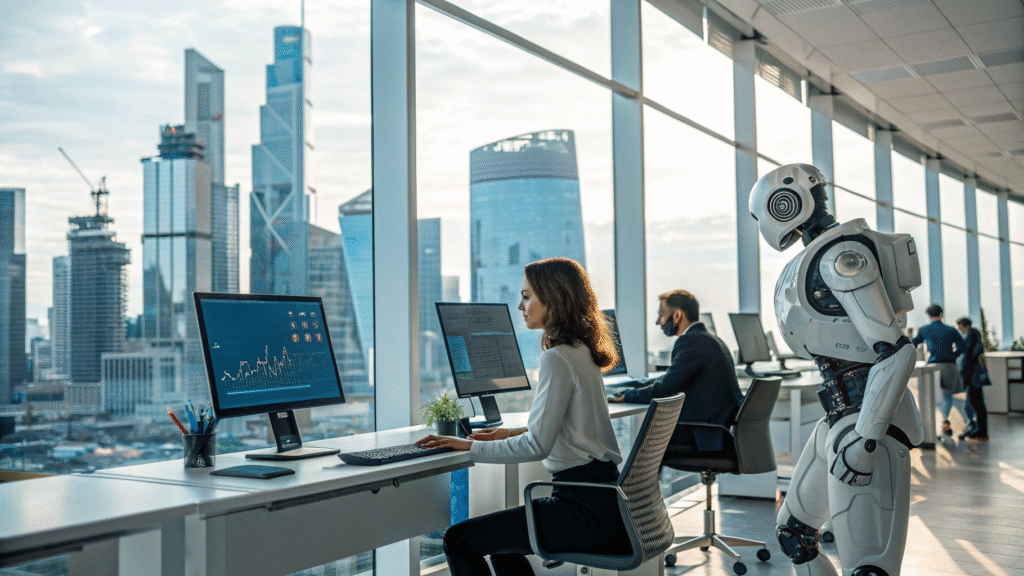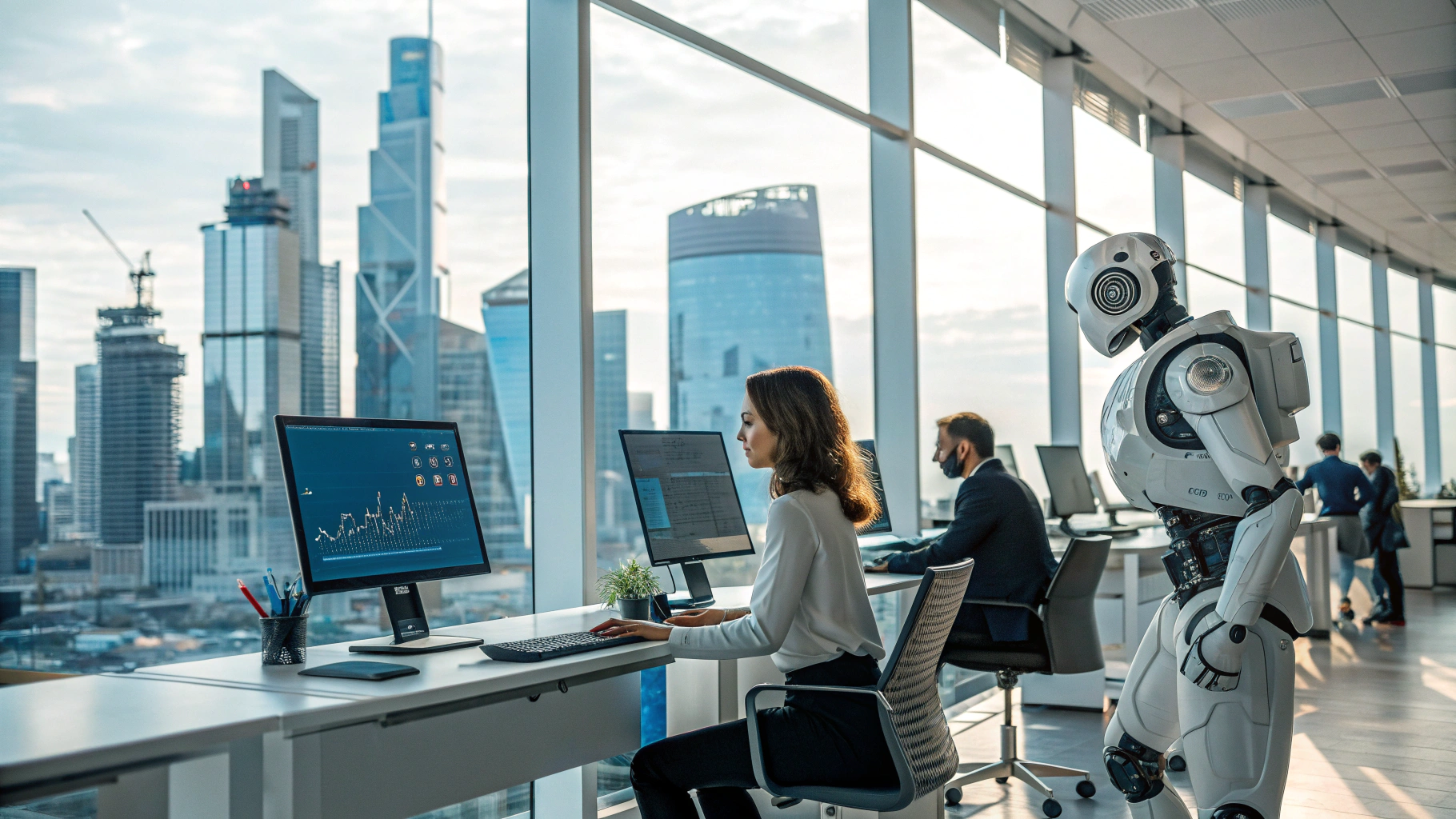The workplace is undergoing a massive transformation in 2025, driven by the rise of Artificial Intelligence (AI) and automation. From customer service chatbots to predictive analytics in finance, AI is no longer just a support tool — it’s becoming a central force that defines how we work.
This article explores how AI is changing the world of work, which jobs are being automated, what skills are in demand, and how professionals can prepare for the future.
How AI is Reshaping the Workplace
Artificial Intelligence impacts every sector — healthcare, education, finance, manufacturing, IT, and even creative industries. Businesses are adopting AI to boost efficiency, reduce costs, and improve decision-making.
Some of the most common workplace applications in 2025 include:
- Automation of repetitive tasks (data entry, scheduling, reporting).
- Chatbots and AI-powered customer support.
- Predictive analytics for sales, HR, and operations.
- AI-assisted creativity in content, design, and marketing.
Jobs at Risk Due to AI and Automation
While AI creates opportunities, it also threatens traditional jobs that rely on repetitive or rule-based tasks.
High-risk jobs include:
- Data entry clerks
- Telemarketers and call center agents
- Cashiers
- Manufacturing line workers
- Routine administrative roles
According to the World Economic Forum, automation could replace 85 million jobs by 2030, but at the same time, it could create 97 million new roles that require human-AI collaboration.
New Jobs Created by AI
While some jobs disappear, AI is giving rise to new careers.
Emerging roles in 2025:
- AI Trainers: Professionals who teach AI models how to perform tasks.
- AI Ethics Specialists: Ensuring AI systems are fair, unbiased, and responsible.
- Prompt Engineers: Experts who design prompts for AI systems like ChatGPT.
- Data Analysts & AI Researchers: Handling massive data for smarter decision-making.
- AI-Integrated Healthcare Professionals: Doctors using AI for diagnosis and treatment planning.
Essential Skills for the AI-Powered Workplace
To stay competitive in the age of AI, workers must upgrade their skills.
1. Technical Skills
- Machine Learning & AI Basics
- Data Science & Analytics
- Cloud Computing (AWS, Azure, GCP)
- Robotic Process Automation (RPA)
2. Soft Skills
- Critical Thinking — evaluating AI-driven decisions.
- Creativity — using AI as a partner in innovation.
- Adaptability — learning to work with new tools quickly.
- Communication — collaborating with both humans and AI systems.
The Role of Human-AI Collaboration
The most successful workplaces will not replace humans with AI but combine human creativity with AI efficiency. For example:
- In healthcare, AI analyzes patient data, while doctors make final treatment decisions.
- In marketing, AI generates campaign ideas, while humans refine strategy and storytelling.
- In software development, AI assists in coding, but engineers oversee system architecture.

Industry-Wise Impact of AI
1. Healthcare
- AI diagnoses diseases faster.
- Virtual health assistants reduce doctor workload.
2. Finance
- Fraud detection with AI algorithms.
- Robo-advisors for personalized investment.
3. Education
- AI tutors and adaptive learning systems.
- Automating grading and student progress reports.
4. Manufacturing
- Smart robots on production lines.
- Predictive maintenance reduces downtime.
5. Creative Industries
- AI-generated music, art, and content.
- Human creativity enhanced by AI tools.
Challenges of AI-Powered Work
Despite its benefits, AI in the workplace raises concerns:
- Job Displacement: Millions may lose jobs to automation.
- Ethical Concerns: AI bias and fairness in hiring decisions.
- Privacy Issues: Employee monitoring through AI tools.
- Skill Gap: Workers unprepared for new technologies.
Preparing for the Future of Work
To thrive in an AI-powered world, individuals and businesses must adapt:
For Employees:
- Learn AI-related skills through online courses.
- Build a portfolio of projects showing AI adaptability.
- Focus on skills that AI cannot replace (empathy, strategy, creativity).
For Businesses:
- Reskill employees instead of replacing them.
- Implement ethical AI policies.
- Use AI to augment human work, not eliminate it.
Future Predictions: What Work Will Look Like in 2030
- Hybrid AI-Human Teams: Most companies will blend human intelligence with AI systems.
- AI Mentors for Career Growth: Employees will have AI-powered assistants guiding skill development.
- Remote Work Evolution: AI will optimize virtual collaboration.
- Lifelong Learning Will Be Essential: Professionals must constantly reskill to stay relevant.
Conclusion
AI is not just reshaping jobs — it’s redefining the very nature of work. While automation threatens repetitive roles, it also creates opportunities for new, high-value careers. The key to thriving in 2025 and beyond is adaptability: learning how to work alongside AI, mastering essential skills, and embracing continuous education.
The future of work is not AI vs humans, but AI with humans — a collaboration that drives productivity, creativity, and growth.


